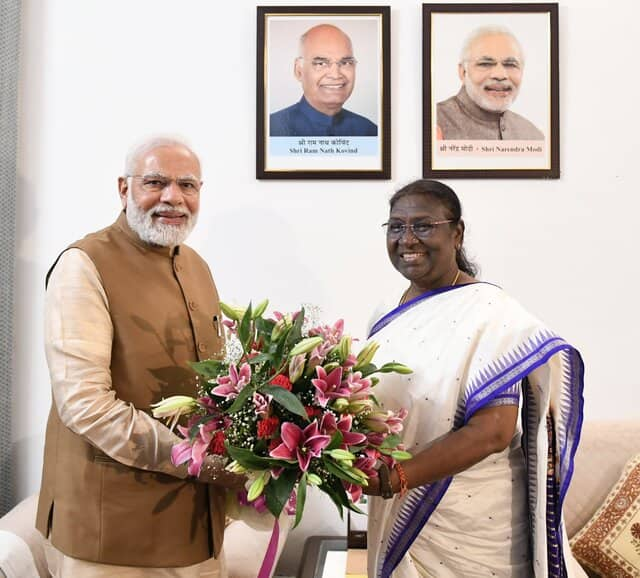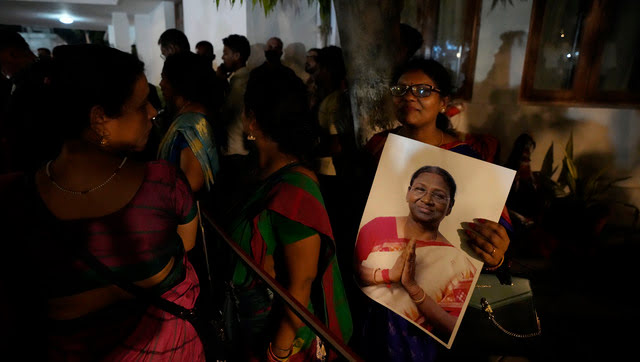“It was the best of times, it was the worst of times, it was the age of wisdom, it was the age of foolishness, it was the epoch of belief, it was the epoch of incredulity, it was the season of Light, it was the season of Darkness, it was the spring of hope, it was the winter of despair,” so begins Charles Dickens’ A Tale of Two Cities (1859). If one looks back at recent events, this famous quotation seems so aptly to describe, respectively, the ruling BJP, growing stronger day by day, and the disunited and scattered Opposition, faring worse by the day. Certainly, 21 July represented this contrast strikingly, some would say, stingingly. Droupadi Murmu, born in a remote Santhal village in Odisha, was elected as the nation’s 15th President. She is the first tribal person, the second woman, and the youngest citizen to be India’s President, head of state, and commander of our armed forces. What is more, she defeated the Opposition candidate, former BJP cabinet minister, Yashwant Sinha, by 6,76,803 votes to 3,80,177. In other words, she polled over 64 per cent of the valid votes, indicating at least three per cent cross-voting in her favour. At 9:50 pm, returning officer PC Mody declared Murmu the winner in the contest, clearing the way to her succeeding outgoing President Ram Nath Kovind. [caption id=“attachment_10944371” align=“alignnone” width=“640”]
 Prime Minister Narendra Modi with newly-elected president Droupadi Murmu. Twitter/ @narendramodi[/caption] Sixty-four-year-old Murmu comes to the highest office of the land with a background that is replete both with a record of public service as well as private suffering. After a brief stint as a teacher, she served as a councillor, legislator, state minister, and, most significantly, as Governor of Jharkhand from 2015 to 2021. Despite this impressive record of professional growth and accomplishments, her private life has been marred by tragedy. She lost her husband, Shyam Charan Murmu, both her sons, her brother, and her mother in a short span of six years from 2009 to 2015. Fortunately, her daughter, son-in-law, and granddaughter are all doing well. It is after her son, Laxman, passed away in 2009 that her life reportedly took a spiritual turn. She found solace in the teachings and practices of the Brahma Kumaris, whose headquarters at Mount Abu she has visited and stayed at several times. Along with a host of leaders, including the Vice-President, M Venkaiah Naidu, Prime Minister, Narendra Modi, BJP president, JP Nadda, senior Brahma Kumari “Dadis” also came to felicitate her on her victory. Murmu, as everyone repeats, will be the first person from a tribal ethnicity to be sworn in as the President of India. Why is this significant? Because many of our so-called Scheduled Tribes, more than 100 million strong, constitute perhaps the most underserved, neglected, and exploited sections of our society. In fact, for centuries they were not really a part of mainstream India at all, living as they did in remote and inaccessible areas. However, from the very earliest of times, they played such an important role in our civilisation. Yet, the fact remains, as Odiya novelist Gopinath Mohanty so eloquently shows in his prize-winning Paraja (1987), that everyone exploited and mistreated them. This is bound to change with a tribal lady being India’s first citizen. The symbolism of a tribal president would take the ideological wind, so to speak, out of Maoist sails; a reduction in insurgency would be a greatly beneficial outcome for the nation. For the Opposition, however, it was a sad day. Some 17 MPs and 126 MLAS from its ranks cross-voted, casting their ballots in favour of Murmu instead of Yashwant Sinha, the candidate of the so-called “united Opposition.” In fact, the Opposition couldn’t be more in a disarray, with the Trinamool Congress (TMC) already announcing that it would not support Margaret Alva, the Opposition nominee for the vice-presidentship. Worse, a visibly weary Sonia Gandhi was questioned for over two hours by the Enforcement Directorate in the National Herald money laundering case. Less than ten years back, she was ranked as the world’s third most powerful woman, just behind German Chancellor Angela Merkel and Brazil’s President Dilma Rousseff. How the mighty have fallen, some would say. The wheel of fortune spins in such a way that no one can predict who will rise or fall — or when. The law of the land must take its course but the Gandhi family of Sonia, Rahul, and Priyanka, known to stick together in both the best and worst of times, may weather this storm too. After all, they have been through worse. But the same cannot be said of the Congress. Once the dominating political force in the country, it is now only a rump, stunted and diminished beyond recognition. As long as Narendra Modi rules the roost, dynasts will be on the run, whether at the Centre or the state levels. That a lady from a disadvantaged, tribal background has become India’s youngest President while the noose is being tightened around the president of India’s oldest and once most powerful political party is a remarkable testimony to Modi’s steely determination, coupled with strategic astuteness. It establishes him, once again, as the greatest changer of India’s destiny since Mahatma Gandhi. The author is a professor of English at Jawaharlal Nehru University, New Delhi. Views expressed are personal. Read all the Latest News
, Trending News
, Cricket News
, Bollywood News
, India News
and Entertainment News
here. Follow us on
Facebook
,
Twitter
and
Instagram
.
Prime Minister Narendra Modi with newly-elected president Droupadi Murmu. Twitter/ @narendramodi[/caption] Sixty-four-year-old Murmu comes to the highest office of the land with a background that is replete both with a record of public service as well as private suffering. After a brief stint as a teacher, she served as a councillor, legislator, state minister, and, most significantly, as Governor of Jharkhand from 2015 to 2021. Despite this impressive record of professional growth and accomplishments, her private life has been marred by tragedy. She lost her husband, Shyam Charan Murmu, both her sons, her brother, and her mother in a short span of six years from 2009 to 2015. Fortunately, her daughter, son-in-law, and granddaughter are all doing well. It is after her son, Laxman, passed away in 2009 that her life reportedly took a spiritual turn. She found solace in the teachings and practices of the Brahma Kumaris, whose headquarters at Mount Abu she has visited and stayed at several times. Along with a host of leaders, including the Vice-President, M Venkaiah Naidu, Prime Minister, Narendra Modi, BJP president, JP Nadda, senior Brahma Kumari “Dadis” also came to felicitate her on her victory. Murmu, as everyone repeats, will be the first person from a tribal ethnicity to be sworn in as the President of India. Why is this significant? Because many of our so-called Scheduled Tribes, more than 100 million strong, constitute perhaps the most underserved, neglected, and exploited sections of our society. In fact, for centuries they were not really a part of mainstream India at all, living as they did in remote and inaccessible areas. However, from the very earliest of times, they played such an important role in our civilisation. Yet, the fact remains, as Odiya novelist Gopinath Mohanty so eloquently shows in his prize-winning Paraja (1987), that everyone exploited and mistreated them. This is bound to change with a tribal lady being India’s first citizen. The symbolism of a tribal president would take the ideological wind, so to speak, out of Maoist sails; a reduction in insurgency would be a greatly beneficial outcome for the nation. For the Opposition, however, it was a sad day. Some 17 MPs and 126 MLAS from its ranks cross-voted, casting their ballots in favour of Murmu instead of Yashwant Sinha, the candidate of the so-called “united Opposition.” In fact, the Opposition couldn’t be more in a disarray, with the Trinamool Congress (TMC) already announcing that it would not support Margaret Alva, the Opposition nominee for the vice-presidentship. Worse, a visibly weary Sonia Gandhi was questioned for over two hours by the Enforcement Directorate in the National Herald money laundering case. Less than ten years back, she was ranked as the world’s third most powerful woman, just behind German Chancellor Angela Merkel and Brazil’s President Dilma Rousseff. How the mighty have fallen, some would say. The wheel of fortune spins in such a way that no one can predict who will rise or fall — or when. The law of the land must take its course but the Gandhi family of Sonia, Rahul, and Priyanka, known to stick together in both the best and worst of times, may weather this storm too. After all, they have been through worse. But the same cannot be said of the Congress. Once the dominating political force in the country, it is now only a rump, stunted and diminished beyond recognition. As long as Narendra Modi rules the roost, dynasts will be on the run, whether at the Centre or the state levels. That a lady from a disadvantaged, tribal background has become India’s youngest President while the noose is being tightened around the president of India’s oldest and once most powerful political party is a remarkable testimony to Modi’s steely determination, coupled with strategic astuteness. It establishes him, once again, as the greatest changer of India’s destiny since Mahatma Gandhi. The author is a professor of English at Jawaharlal Nehru University, New Delhi. Views expressed are personal. Read all the Latest News
, Trending News
, Cricket News
, Bollywood News
, India News
and Entertainment News
here. Follow us on
Facebook
,
Twitter
and
Instagram
.
Off-centre | The best of times for BJP, the worst of times for Opposition
Makarand R Paranjape
• July 22, 2022, 15:58:01 IST
While a lady from a disadvantaged, tribal background has become India’s youngest President, the noose is being tightened around the president of India’s oldest and once most powerful political party
Advertisement
)
End of Article